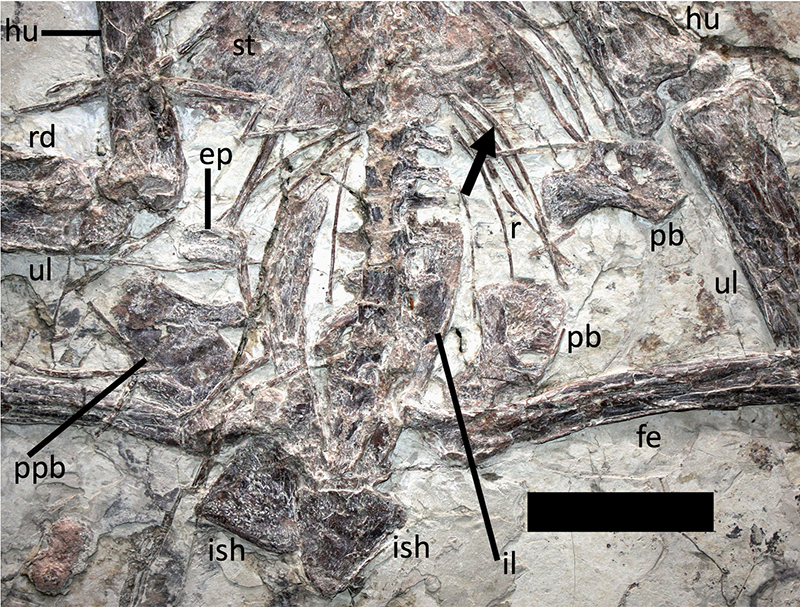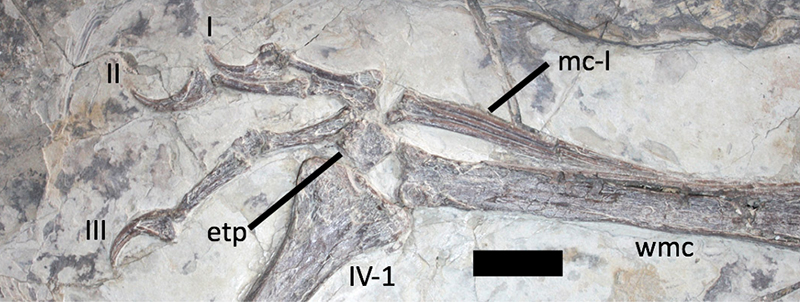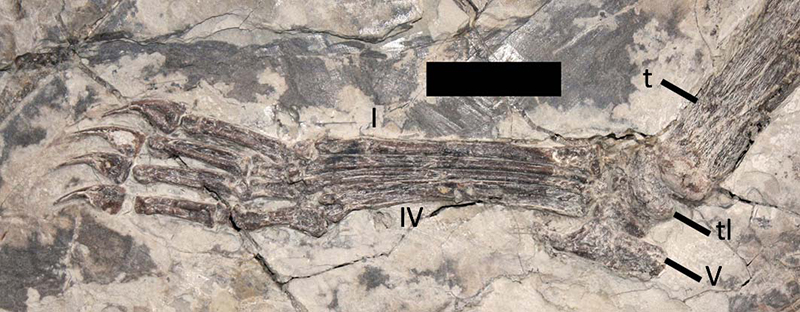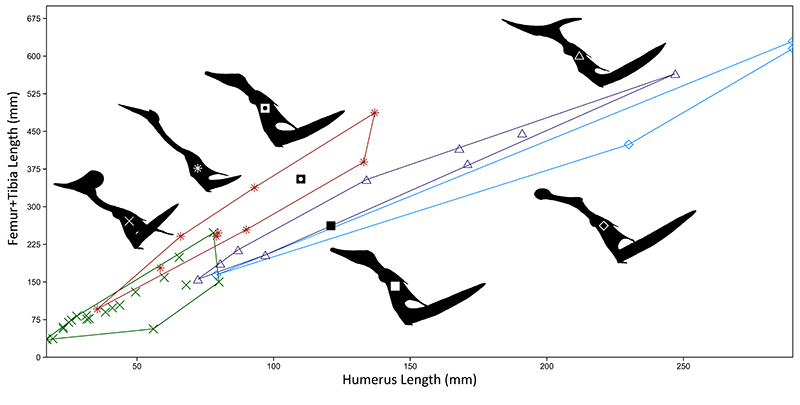FIGURE 1. Specimen ELDM 1000, holotype of Luichibang xingzhe. Visible scale bar is 100 mm. Abbreviations throughout are as follows: cc, cranial crest; co, coracoid; cp, carpals; cv, cervical vertebrae; ep, epiphysis; etp, extensor tendon process; fe, femur; hu, humerus; hy, hyoids; il, ilium; ish, ischium; m, manus; mc, metacarpal; mn, mandible; mt, metatarsal; naof, nasoantorbital fenestra; pb, pubis; ppb, prepubis; ps, pes; ptd, pteroid; r, rib; rd, radius; sc, scapula; sf, soft tissues; sk, skull; st, sternum; t, tibia; tl, tarsals; ul, ulna; wmc, wing metacarpal; wpx, wing phalanx.

FIGURE 2. Cranium of ELDM 1000. The block arrow points to a fossil fish. Scale bar is 50 mm. Abbreviations throughout are as follows: co, coracoid; cv, cervical vertebrae; hy, hyoids; mn, mandible; naof, nasoantorbital fenestra; sk, skull.

FIGURE 3. Cervical column of ELDM 1000. Cervicals are numbered. Scale bar is 50 mm. Abbreviations throughout are as follows: cc, cranial crest; co, coracoid; cv, cervical vertebrae; mn, mandible; sc, scapula; sf, soft tissues; sk, skull.

FIGURE 4. Chest region of ELDM 1000. Scale bar is 50 mm. Abbreviations throughout are as follows: cdv, cervicodorsal vertebrae; co, coracoid; ep, epiphysis; hu, humerus; mn, mandible; pb, pubis; r, rib; rd, radius; sc, scapula; sf, soft tissues; st, sternum; ul, ulna.

FIGURE 5. Pelvic region of ELDM 1000. Scale bar is 50 mm. The black arrow points to a fossil fish largely concealed by a rib. Abbreviations throughout are as follows: ep, epiphysis; fe, femur; hu, humerus; il, ilium; ish, ischium; pb, pubis; ppb, prepubis; r, rib; rd, radius; sk, st, sternum; ul, ulna.

FIGURE 6. Manus of ELDM 1000. Abbreviations throughout are as follows: etp, extensor tendon process; mc-I, metacarpal I; wmc, wing metacarpal; I, digit I; II, digit II; III, digit III; IV-1, wing phalanx I. Scale bar is 20 mm.

FIGURE 7. Pes of ELDM 1000. Abbreviations throughout are as follows: t, tibia; tl, tarsals; I, metatarsal I; IV, metatarsal IV; V, metatarsal V. Scale bar is 20 mm.

FIGURE 8. Analysis of eupterodactyloid pterosaur relationships showing the phylogenetic position of Luchibang. Major clades are labelled and numbers represent the numbers of characters (see Supplemental Data S1) that are unambiguous apomorphies of each clade (please see Corrigendum).

FIGURE 9. Analysis of pterosaur limbs proportions comparing humerus length to hindlimb length. Istiodactylids are represented by squares, ornithocheirids by diamonds, pteranodontids by triangles, ctenochasmatids by crosses, and azhdarchoids by asterisks. Luchibang is represented by a square containing a circle. Silhouettes courtesy of, and used with permission from, Mark Witton.


